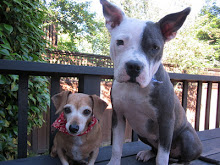 In November we wrote about canine cancer and osteosarcoma - a bone tumor which often leads to leg amputations. Now we are happy to share some positive updates about the fight against canine cancer. The Morris Animal Foundation (MAF) is leading the effort to find a cure within the next 10 - 20 years. MAF has funded over 100 canine cancer studies so far, including one on osteosarcoma at Ohio State University. The study found that combining traditional chemotherapy drugs with suramin, an anti-parasitic agent, can help dogs live longer after the affected limb is amputated. Suramin has been particularly effective in treating Greyhounds with osteosarcoma.
In November we wrote about canine cancer and osteosarcoma - a bone tumor which often leads to leg amputations. Now we are happy to share some positive updates about the fight against canine cancer. The Morris Animal Foundation (MAF) is leading the effort to find a cure within the next 10 - 20 years. MAF has funded over 100 canine cancer studies so far, including one on osteosarcoma at Ohio State University. The study found that combining traditional chemotherapy drugs with suramin, an anti-parasitic agent, can help dogs live longer after the affected limb is amputated. Suramin has been particularly effective in treating Greyhounds with osteosarcoma.Another MAF sponsored study investigated mammary tumors. Mammary gland (or breast) cancer is the most common tissue abnormality in female dogs, especially those who are unspayed. We learned this firsthand with Greta. She wasn't spayed until she entered Dachshund rescue at about age 10, and she had several large mammary tumors as a result. Fortunately they proved to be benign, although between 40% - 50% are typically malignant. This is why it's so important to have female dogs spayed as early as possible. Whenever we encounter folks with unspayed dogs, we tell them about Greta and the grueling tumor removal surgery she had to go through.
Canine cancer is an important topic for all dog lovers since it kills one in four of our furry friends. As a result, the American Veterinary Medical Association and the Veterinary Cancer Society have paired up to create a warning list of cancer symptoms:
-Abnormal swellings that persist or continue to grow
-Sores that do not heal
-Abnormal swellings that persist or continue to grow
-Sores that do not heal
-Weight loss
-Loss of appetite
-Bleeding or discharge from any body opening
-Offensive odor
-Difficulty eating or swallowing
-Hesitance to exercise or loss of stamina
-Persistent lameness or stiffness
-Difficulty breathing, urinating, or defecating
Some breeds are particularly susceptible to certain forms of cancer. Osteosarcoma is most prevalent among giant breeds like Great Danes, Newfoundlands, and Bernese Mountain Dogs, and large breeds like Greyhounds and Rottweilers. Although this is currently the case, imagine how wonderful it would be if canine cancers like osteosarcoma were eradicated in the next decade? Hopefully the Morris Animal Foundation's major campaign will continue to yield successful insights to help advance the path toward a cure.
Some breeds are particularly susceptible to certain forms of cancer. Osteosarcoma is most prevalent among giant breeds like Great Danes, Newfoundlands, and Bernese Mountain Dogs, and large breeds like Greyhounds and Rottweilers. Although this is currently the case, imagine how wonderful it would be if canine cancers like osteosarcoma were eradicated in the next decade? Hopefully the Morris Animal Foundation's major campaign will continue to yield successful insights to help advance the path toward a cure.




1 comment:
Alfie
http://www.clarksfarmgreyhounds.ik.com/
Got my greyhound from them as did my daughter and my son who worked there
Post a Comment